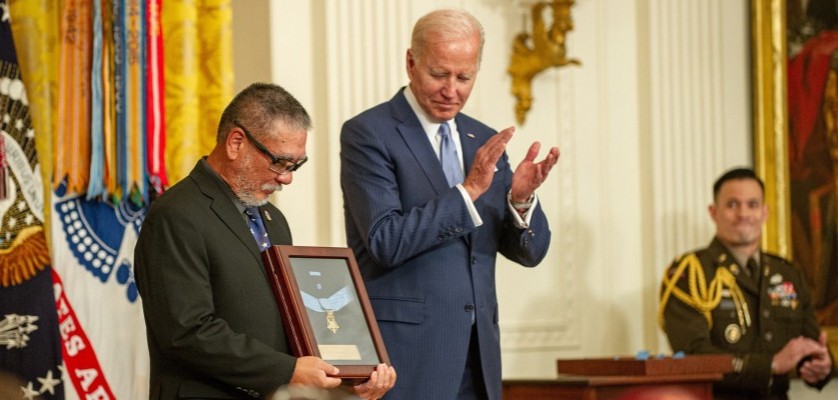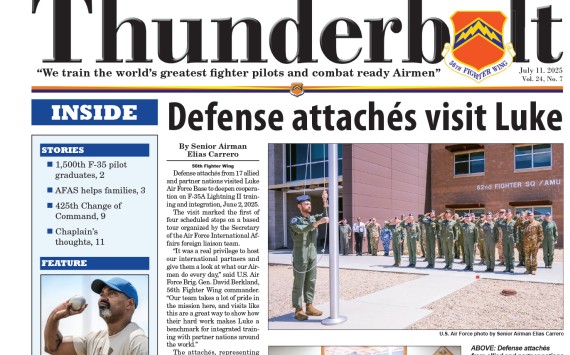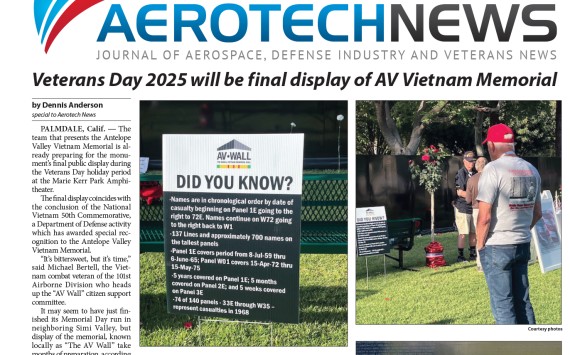Four U.S. Soldiers who risked their lives to defend fellow service members and allies in the jungles of South Vietnam finally received the nation’s highest military honor, about 50 years after their heroic actions.
During a ceremony at the White House Tuesday, President Joe Biden awarded the Medal of Honor to Vietnam War veterans Spec. 5 Dennis Fujii, Spec. 5 Dwight Birdwell, Maj. John Duffy and Staff Sgt. Edward Kaneshiro, who died in battle and received it posthumously.
“It’s been a long journey to this day for those heroes and their families,” Biden said to the recipients and their loved ones during a ceremony in the White House’s East Room. “And more than 50 years have passed since those Soldiers have proved their mettle. But time has not diminished their astonishing bravery, their selflessness … or the gratitude that we as a nation owe them.”
Each of the Soldiers had their previous awards upgraded.
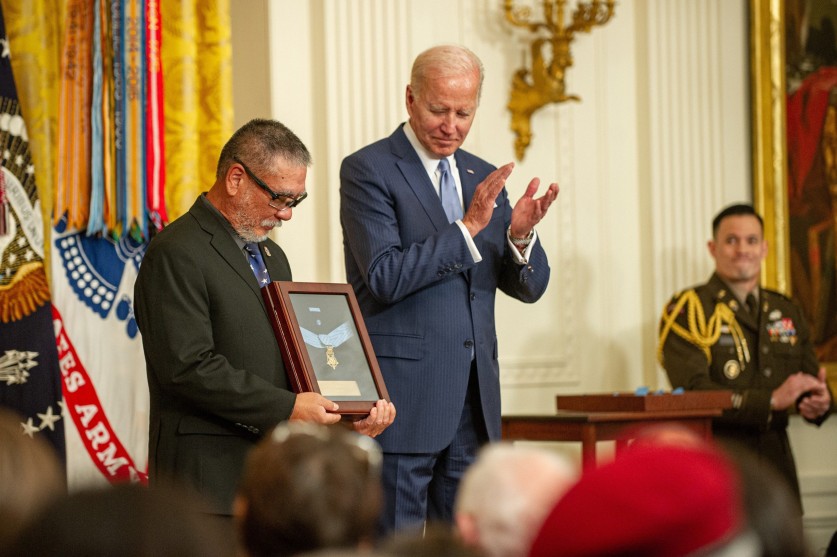
Staff Sgt. Edward Kaneshiro
When a superior North Vietnamese force attacked two squads of his platoon on Dec. 1, 1966, Kaneshiro, an infantry squad leader, knew he had to react. He told his squad to take cover as he engaged the enemy force alone in the Kim Son Valley village. Armed with six grenades and a rifle, the Oahu, Hawaii, native suppressed gunfire from a nearby trench with one grenade, then leapt into an enemy bunker and dispatched two squads with more grenades and another with his rifle.
His actions helped the trapped squad members eventually evacuate the village.
Kaneshiro continued to serve in the Army until March 1966 when he was killed by enemy gunfire. He left behind his widow, Mitsuko, and five children. Mitsuko passed away on April 10, 2022, at age 90. Kaneshiro’s son, John, accepted the award on his behalf.
“Today his memory lives on in the lives he saved, and the legend of his fearlessness and the hearts of his family that he left behind,” Biden said. “I know that no award could ever make up for the loss of your father, for not having him there as you grew up, but I hope today you take some pride and comfort in knowing his valor is finally receiving the full recognition that it always has deserved.”
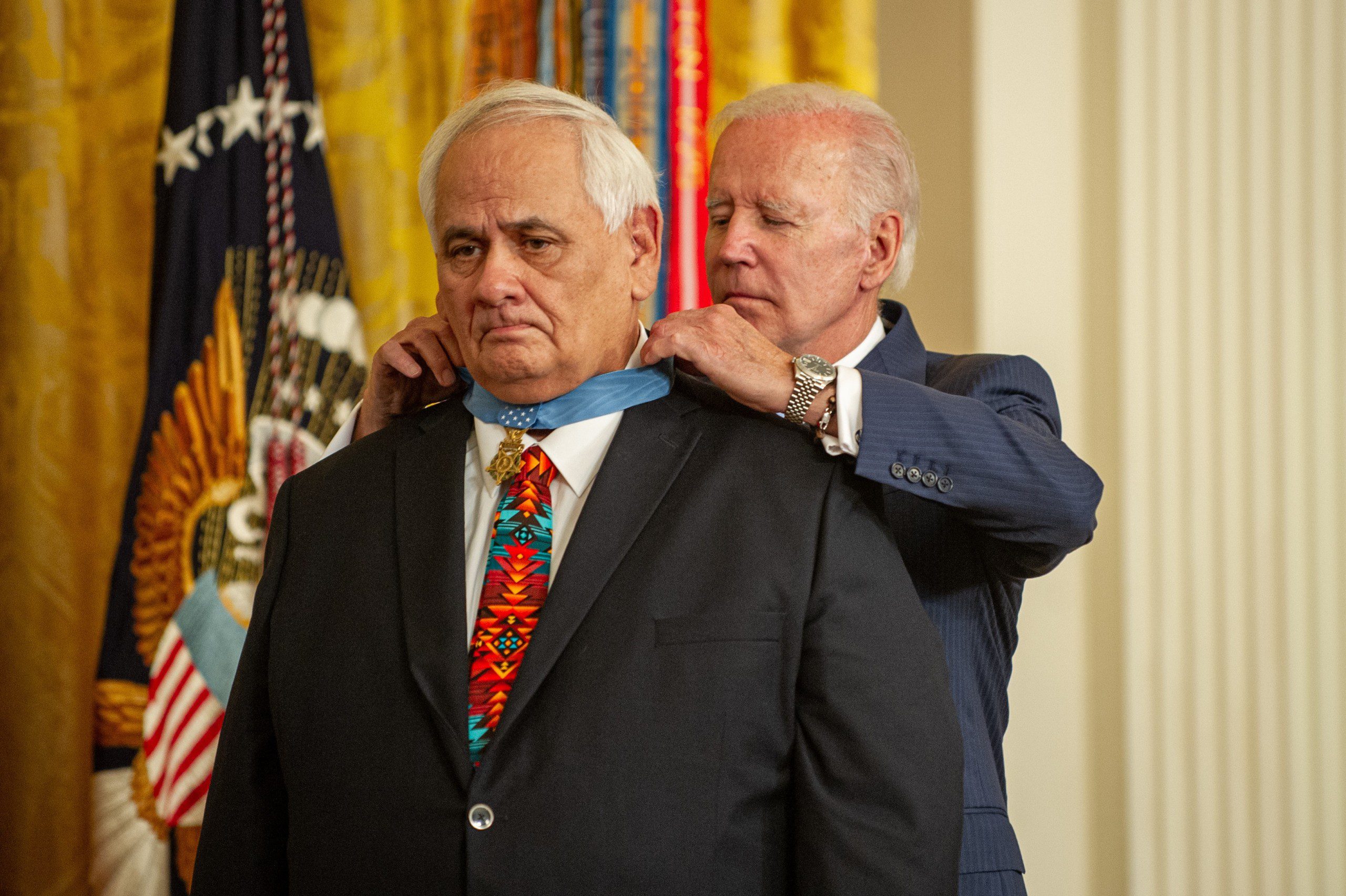
Spec. 5 Dwight Birdwell
During the Tet Offensive on Jan. 31, 1968, Birdwell and his unit felt the full extent of an enemy force attack, as enemy rounds disabled his tank commander and several vehicles in his convoy.
After Birdwell moved his tank commander to safety, he entered the commander’s hatch and fired upon the attacking enemies until he exhausted the tank’s ammunition.
“He knew his vehicle was the first line of defense,” Biden said. “He sustained fire, drove back the attackers and created a place of relative safety for the injured men.”
Birdwell refused medical attention after the machine gun he recovered exploded and injured him. Biden said that even after receiving orders to take medical treatment for his wounds, Birdwell snuck out of the medevac helicopter and continued fighting. Birdwell finally agreed to be evacuated after treating fellow troops and after reinforcements had arrived.
Birdwell, a member of the Cherokee Nation from Oklahoma, continues a long tradition of Native Americans serving in the armed forces. He went on to have a successful career in law, first serving as a member of the Cherokee Nation Supreme Court, then as its chief justice and finally as an Oklahoma City attorney.
“I’m grateful for all you’ve given to our country and at long last … your story is being honored as it should have been,” Biden said.
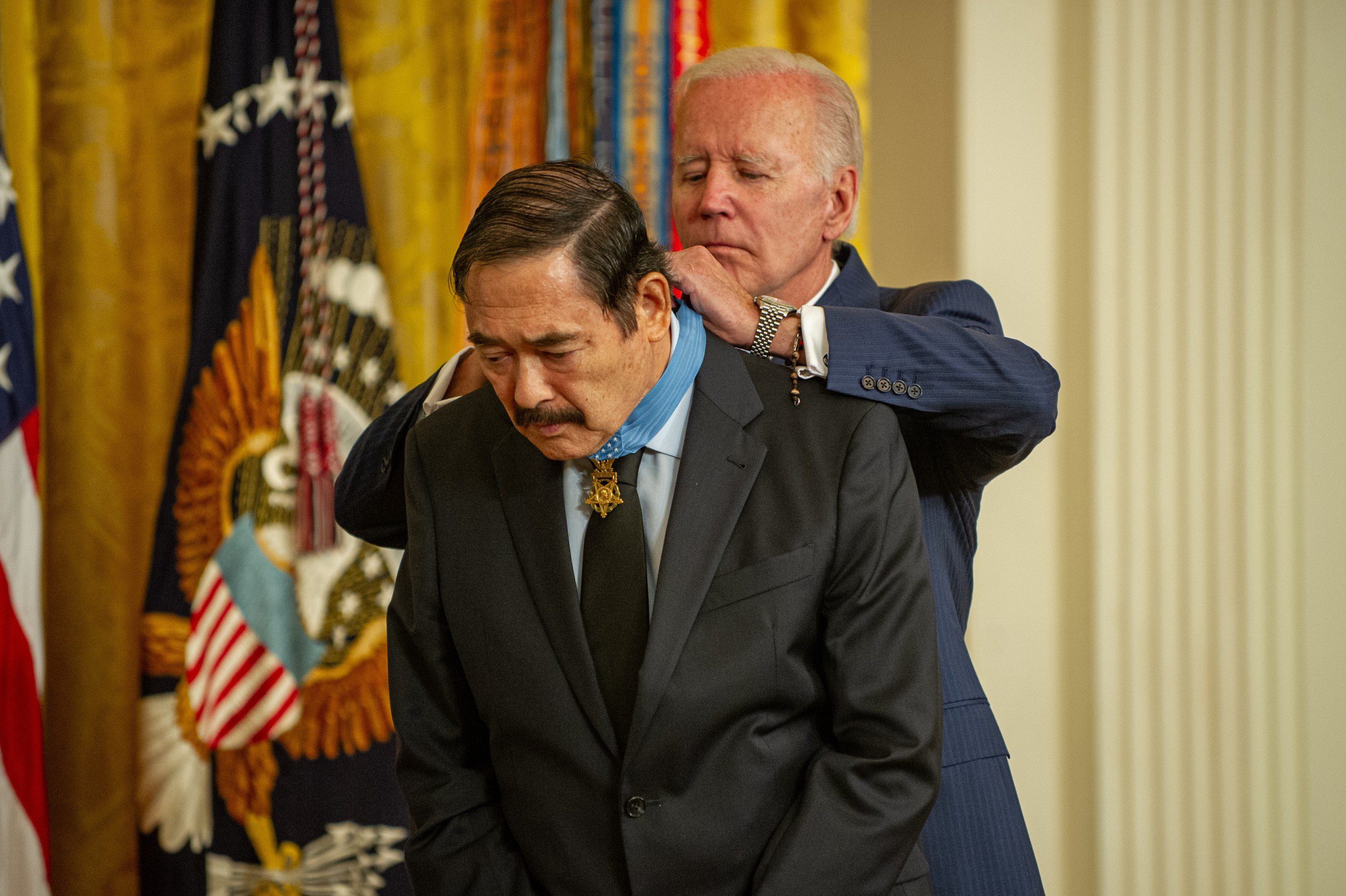
Spec. 5 Dennis Fujii
In the midst of a rescue operation of South Vietnamese troops on Feb. 18, 1971, enemy fire brought Fujii’s helicopter to the ground.
A second helicopter successfully evacuated all U.S. troops except for Fujii, who waved the chopper away for the safety of his fellow service members after enemies directed gunfire at him.
Fujii, a crew chief, underwent a harrowing 17 hours as he remained to treat wounded allies while enemy fire prevented subsequent attempts to rescue him.
Finally, a helicopter rescued Fujii before enemy rounds forced it to crash-land at a friendly camp. The native of Kauai, Hawaii, remained there for two more days before finally being evacuated.
“Today, Spc. 5 Fujii, we remember and we celebrate just how many people you’ve helped,” Biden said. “We will forever honor your commitment to your crew, your allies and your country.”
Fujii was later inducted into the Army Aviation Museum’s Hall of Fame.
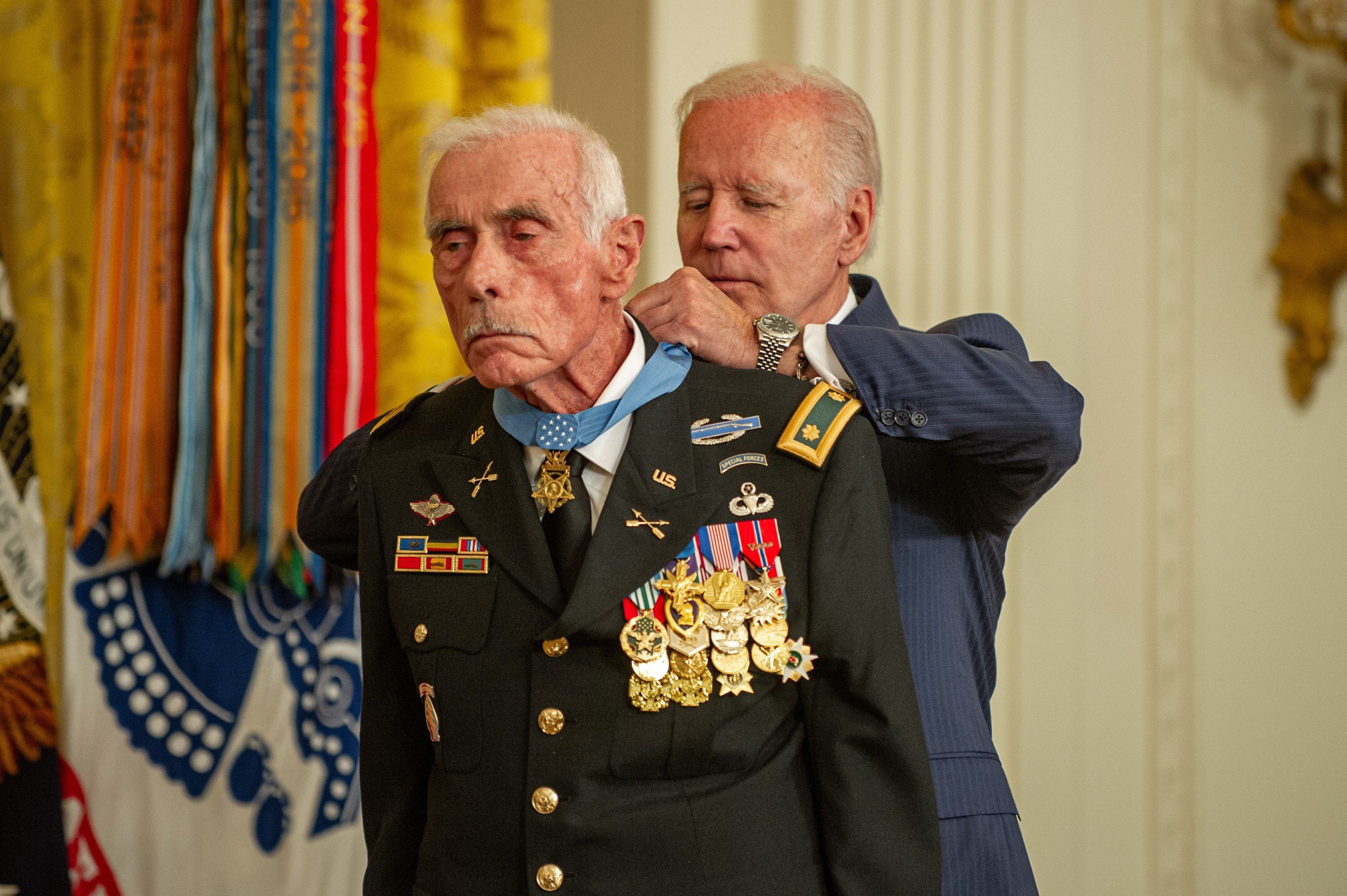
Maj. John Duffy
Duffy, known by his call name “Dusty Cyanide,” had already suffered two injuries during enemy attacks in the days before April 14, 1972. A senior advisor to the Republic of South Vietnam, Duffy had already lost his commander and battalion command post.
Over the course of two days, April 14-15, Duffy would lead the defense of Fire Support Base Charlie. Refusing to be treated for injuries multiple times, Duffy directed airstrikes against enemy forces while exposing himself to hostile rounds.
During an afternoon assault, Duffy directed gunfire on a friendly position that had been compromised. Finally, after an ambush attack the following morning, Duffy led the survivors to an evacuation point. He then directed U.S. gunship fire to establish a landing zone and then proceeded to treat the wounded.
After 29 years of military service, Duffy went on to have a successful career as a writer and poet, publishing six books and even earning a Pulitzer Prize nomination.
“He is the definition of a warrior-poet,” Biden said. “Thank you Maj. Duffy for all that you’ve inspired in others.”






